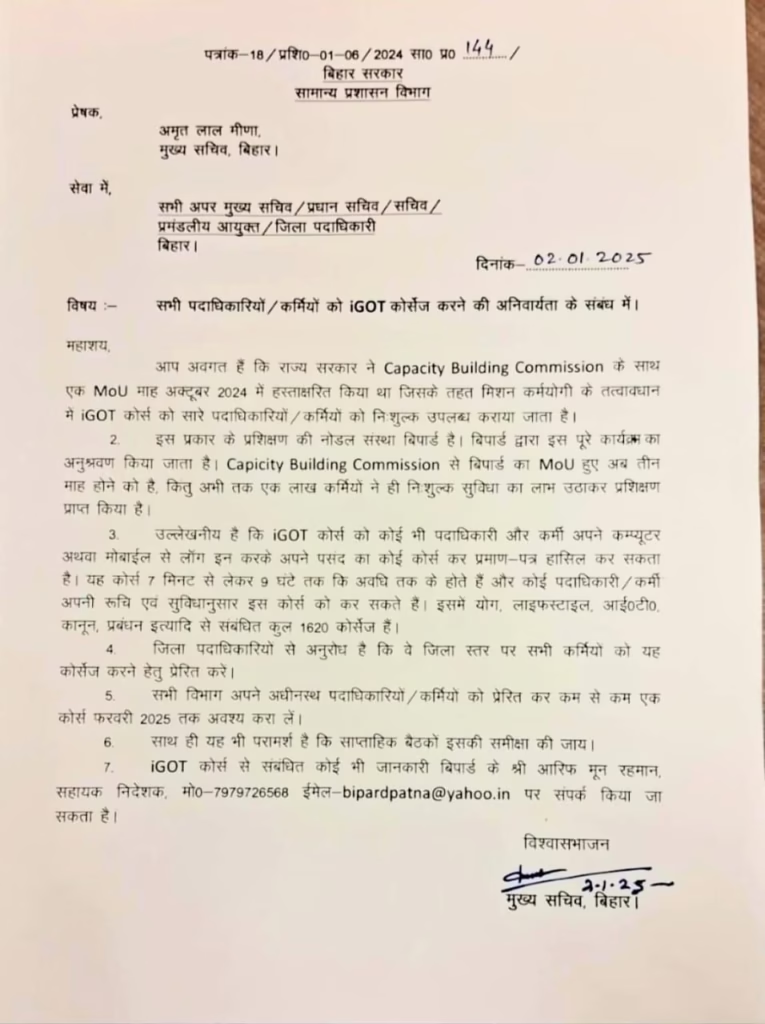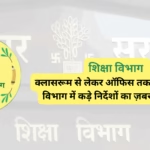Preface
The Bihar government has taken a historical initiative to develop the skills of its employees and officers. After the agreement (MOU) with the Capacity Building Commission in October 2024, IGOT (Integrated Government Online Training) courses have been made mandatory for all under Mission Karmayogi. This decision is a major step to increase administrative capacity and keep the personnel updated in the digital age. In this post, we will understand every aspect of this scheme in detail: Nature, Registration Process, Advantages, Challenges, and Socio-Economic Effects.
Part 1: Introduction and Background of IGOT Courses

1.1 What is Mission Karmayogi?
Mission Karmayogi is a major initiative of the Government of India, which aims to mold the skills and ability of government employees to the new age needs. Under this, free training is given to personnel through digital learning platforms. The Bihar government signed an MOU with the Capacity Building Commission (CBC) in October 2024 to implement this mission at the state level.
1.2 IGOT Course Role
These courses available on the IGOT platform are designed to increase the professional qualification of personnel in various fields. These include modules associated with soft skills, technical knowledge, management skills, and policy making. Its nodal agency in Bihar is Bipard of Public Administration and Rural Development, which is monitoring and implementing training.
1.3 Importance of MOU
The main goal of this agreement between CBC and the Bihar government is:
- To prepare government employees for the future.
- To meet the goals of Digital India and Good Governance.
- Improving the quality of administrative services.
Part 2: Detailed information about IGOT courses
2.1 Variety of Courses
There are a total of 1620 courses available on the IGOT platform, which are divided into the following categories:
- Technical skills: IT, data analytics, cyber security.
- Management: Team Leadership, Project Management, Resource Management.
- Law and Policy: Public Policy, Cyber Law, Governance.
- Health and lifestyle: yoga, stress management, nutrition.
- Social Development: Rural Development, Sexual Equality, Education Policy.
2.2 Course Duration and Flexibility
- Microlearning: 7 minutes to 1 hour of small modules (eg, “basic principle of e-governance”).
- Deep Learning: Detailed course ranging from 3 hours to 9 hours (eg, “Certificate in Project Management”).
- Self-pied Learning: Workers can complete the course at any time at their convenience.
2.3 Certificate and Recognition
- There is an online assignment/quiz at the end of each course.
- A digital certificate is issued on scoring more than 50% marks.
- This certificate can be added to the APAR of Employees, which is helpful in promotion.
Part 3: How to do IGOT courses? (Step-by-step guide)
3.1 Registration Process
- Step 1: Go to the IGOT portal.
- Step 2: Click “Register” and enter your mobile number/email.
- Step 3: After OTP verification, fill in your department, designation, and district details.
- Step 4: Go to “Course Catalog” and choose your interest course.
3.2 Tips to Complete the Course
- Time Management: Take 30 minutes daily.
- Create notes: Download a PDF or write important points.
- Group Study: Discuss together with colleagues.
3.3 Solve Problems
Login Issue: Use the “Forgot Password” link for password reset.
Technical Support: Contact Bipard Helpdesk (Mo 7979726568).
Part 4: Why are IGOT courses mandatory?
4.1 Current Status and Goal
From October 2024 to December 2024, only 1 lakh personnel have completed the course, while the target is 5 lakhs. Everyone must complete at least one course by February 2025.
4.2 Government expectations
- Skill development: Keeping personnel relevant in the digital age.
- Service Distribution: Providing better facilities to citizens.
- Employment capacity: Make employees equal to the private sector.
4.3 Logic Behind Mandatory
Execution pressure: Under MOU, the Bihar government has to give a progress report to the CBC. Financial commitment: The government has allocated crores of rupees for courses.
Part 5: Responsibility of departments and district officials
5.1 Work of District Officers
- Awareness Campaign: To organize workshops up to the panchayat level.
- Monitoring: Preparation of weekly reports and sending Bipard.
- Incentive: Awarding top-performing personnel.
5.2 Role of Departmental Heads
- Target Settlement: Target to complete the course for each month.
- Providing resources: Setting for the 1-hour course at office time.
5.3 Role of Bipard
- Designing training modules: preparing courses to suit the specific requirements of the state.
- Dashboard update: Tracking progress in real-time.
Part-6: Socio-economic effects of IGOT courses
6.1 Improvement in the Governance System
- Transparency: E-governance courses will reduce corruption.
- Civil Satisfaction: Better service distribution will increase public confidence.
6.2 Economic Benefits
- Employment generation: Skills with skills can also get opportunities in the private sector.
- State image: Bihar will emerge as a progressive administrative model.
6.3 Personal Development
- Career Growth: Certificates will help in promotion and project leadership.
- Lifestyle: Mental health will improve with the course of yoga and stress management.
Part 7: Challenges and Solutions
7.1 Possible Obstacles
- Digital inequality: Internet shortage in rural areas.
- Lack of time: Due to excessive charges, workers do not prioritize the course.
7.2 Solution Measures
- Offline facility: providing courses through CD/Pen Drive by Bipard.
- Incentive amount: Cash prizes or leave to those who complete the course.
Part 8: Conclusion
This move of the Bihar government is important not only for the individual development of the personnel but also for the upliftment of the overall state. All personnel should complete the IGOT courses before the February 2025 deadline and be a part of this historical initiative.
Remember: “Learning is a lifetime process. Today’s investment is tomorrow’s advancement.”



